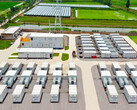The world's largest EV battery makers CATL and BYD are pressing ahead with their sodium-ion cell plans, despite that the drastic lithium price drop has made sodium batteries less attractive from a financial standpoint.
BYD already announced that it is building a sodium battery plant, and now CATL confirmed that it will press ahead with the second generation of the technology.
Its first-gen sodium packs are already in electric cars and offer up to 160 Wh/kg energy density, significantly less than lithium batteries. CATL, however, is using them in hybrid AB designs that feature the best of both worlds.
"By combining sodium-ion batteries with lithium-ion batteries in the same pack, the inadequate energy density of sodium-ion batteries at this stage can be made up, and the advantages of sodium-ion batteries in good performance under large powers and low temperatures can be brought into play, and hence more application scenarios can be developed," says CATL.
Its second generation of sodium-ion batteries, however, will hit 200 Wh/kg energy density, which will make them a viable standalone contender to lithium-dependent chemistries.
CATL said that it is also ready to license its battery technologies and production know-how with any major stakeholder, be it an electric car company or a competing battery maker. It agrees that the Chinese EV industry doesn't suffer from oversupply, and there is an actual dearth of quality battery production projects:
As the world steps up its efforts to combat climate change, there is still huge market growth potential, e.g. about 16.7 million passenger EVs are expected to be sold globally in 2024, BNEF projects. High-quality and effective production capacity is still limited. What is more, many announced plants have not been implemented, and it is unclear if announced capacity will actually be achieved.
This is why CATL is in talks with a number of automakers and energy storage companies, among which Tesla, Ford, and GM, to license its battery technology under its LRS (License Royalty Service) program.
Of those, Ford's LFP battery factory in Marshall, MI, is in the most advanced stage of development, tips CATL. Ford, however, got in hot water over its Chinese battery factory strategy when it comes to federal tax credit subsidies.
Tesla is reportedly being wiser when it comes to its dealings with CATL on US soil, and will only source the equipment and know-how from the Chinese battery maker in order to placate the White House and its tax credit spree.
The LRS program is designed precisely to help automakers quickly scale up local battery production with minimal involvement by CATL. It would be worth it, too, as some of the most practical EV battery innovations in recent memory come from CATL.
Besides cheap and energy-dense LFP packs, CATL is also developing said sodium-ion cells, and even plans to start mass solid-state battery production in 2027, so a stable licensing partnership can only benefit Tesla, Ford, GM, NIO, and all of its other customers.
"CATL places great emphasis on solid-state batteries, has been working on them for years and has recently invested a lot more, and remains a leader in this area," confirmed its spokesperson.
Get the 80A Tesla Gen 2 Wall Connector with 24' cable on Amazon




















